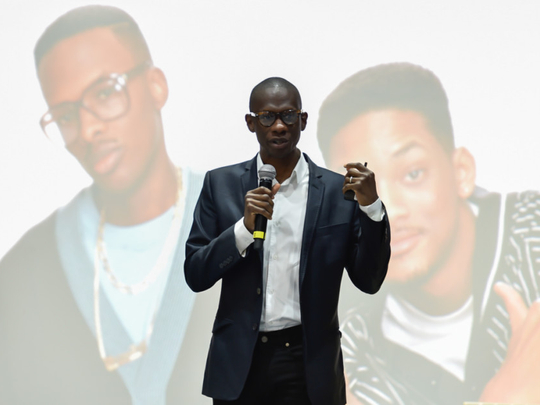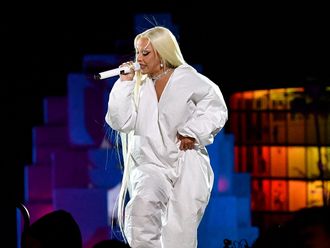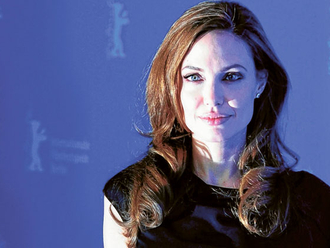
The good news is that someday, we’ll all be able to use Spotify in the Middle East. The bad news is that day is not today, according to Troy Carter, the head of creative services at the Swedish streaming company.
“Nothing to announce, but I think Spotify is a global company, and I think [CEO and founder] Daniel [Ek’s] mission is to get the music to everybody, everywhere. So I think eventually, yeah,” Carter said at a Gitex Startup Movement conference in Dubai on Monday.
Founded in 2006, Spotify is a music, podcast and video streaming service, which legally allows its subscribers to load content online. It’s available in parts of North America, Europe, Asia and Oceania.
Carter, 43, joined the company as head of creative services four months ago. Before that, he spent 17 years working as a talent manager — most notably helping Lady Gaga launch her career in 2007.
It all began when Carter dropped out of high school at 17. He spent months lurking outside Will Smith and DJ Jazzy Jeff’s recording studio in West Philadelphia — Carter’s hometown — and lusting after a record deal. Carter’s band, 2 Too Many, did get their wish, but they “quickly learned we sucked” and lost their contract.
At 21, Carter fell into promoting concerts and leafletting instead. One night, he was promoting a Notorious B.I.G. concert that Biggie never showed up to and met P. Diddy, who said he would take Carter under his wing if Carter could get him “the girl from behind the bar.”
Carter did.
“What was interesting was that working with Will Smith, I was able to learn the media business from 30,000 feet — but working for P. Diddy, it gave me a chance to really understand hustle and how to be an entrepreneur,” he said.
After working with P. Diddy until 1999, Carter landed a gig as the manager of recording artist Eve. “I’d never managed anyone before. I had literally no idea what I was doing.”
Carter spent five years working with Eve, and they built a boutique talent management firm together. But things went downhill quickly.
“One day, Eve walked in and told me I was fired,” said Carter. “My house was being foreclosed on. Cars were being repossessed. [I got an] eviction notice from the office.”
Carter recalled something his grandmother used to tell him: “You can’t fall from the floor.” He had no choice but to get back up.
“A good buddy of mine called me shortly after and said, ‘I got this artist that I want you to meet. She’s from New York. I just heard her music on MySpace and I want to bring her out so she can meet with you,” said Carter.
“That girl ended up being Lady Gaga. We set out on this mission that we were going to take over the world.”
Gaga had just been dropped from Def Jam Records and had “spent the last four months on her grandmother’s couch in West Virginia licking her wounds.”
“We took the music to the radio stations and got the door slammed in our face,” said Carter.
“The music wasn’t good enough. At that time, Christina Aguilera, Britney Spears, Jessica Simpson, those were the big pop stars. The music we were playing, they thought, was more European music.”
But they got lucky. Facebook, Twitter and YouTube were all on the rise.
“All of a sudden, we were using this new thing called social media to reach the fans directly,” he said.
Carter continued on as Gaga’s manager for nearly seven years before she let him go, citing ‘creative differences’. He has worked with several rising artists since, including Priyanka Chopra. He founded a ‘diversified entertainment company’ called Atom Factory, which currently lists Charlie Puth and Meghan Trainor amongst its clientele.
Carter recalled being told by investors that he would need to look “more like Mark Zuckerberg” to get funding. Or that he would only invest in black-owned companies, rather than the next multi-billion dollar company.
“I said, ‘Who said a black founder can’t build the next billion dollar company?’”
But Carter persevered, and his bumpy career has given him sharp insight into the evolution of the music industry, from 8-track cassette tapes and vinyl, to music streaming and virtual reality. According to him, artists today have unprecedented access to data. They can identify ‘super fans’ and deliver next-level experiences to them.
“A super fan is somebody who listens to this artist more than any other artist on the platform. These are the fans who want to be reached,” said Carter.
And through ‘mixed reality’, they can now, for instance, integrate music videos into their live shows — similar to Beyonce’s Tidal X performance on Saturday night, where she performed opposite a hologram of herself.
“I can say it’s going to be very interesting for artists,” Carter said. “It creates a new playing field.”













